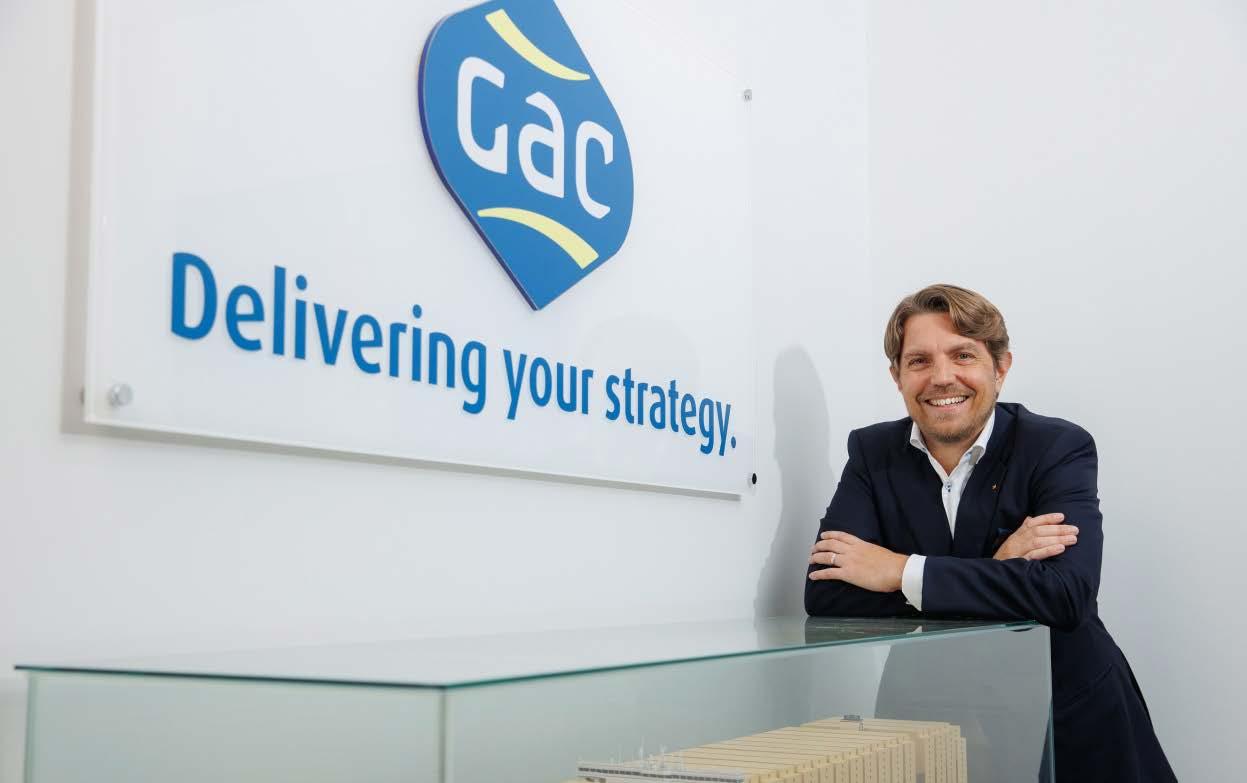
3 minute read
SPOTLIGHT: FAR EAST
from BTI Spring 2023
by Maritime-AMC
Indian subcontinent. “The combination of GAC’s global network with the strong local presence and know-how of SME Logistics will mark a new chapter for us.”
The launch of the new facility comes in response to growing customer demand for shipping and logistics services in the region, as well as providing an opportunity to support exploration, production and maintenance operations for Vietnam’s burgeoning offshore wind farm projects.
GAC’s office in Vietnam follows the opening of a new office in Taichung, Taiwan, in November 2022. Establishing GAC’s footprint in Vietnam comes as the Southeast Asian country undergoes a renewable energy revolution with a target of being net zero by 2050. Vietnam is planning to scale up its windpower generation capabilities to about 30% by 2050, up from 5% currently, with more than 120 offshore wind farm projects currently under scheduled for construction.
Swire Bulk joins ssi
Swire Bulk is the latest member of the Sustainable Shipping Initiative (SSI), joining ambitious organisations across the maritime ecosystem in working towards a more environmentally, socially, and economically sustainable shipping sector.
Headquartered in Singapore, Swire Bulk is a vessel owner and operator in the dry bulk sector, with a trading fleet of around 150 handysize and supramax vessels commercially controlled by eight global offices. The company was first founded in 2012 as a division within the China Navigation Company (CNCo) and separated from CNCo in 2021 to stand alone as the specialist bulk trading arm of the multinational Swire Group.
Swire Bulk is committed to being a leader in sustainability and to contribute to the decarbonisation journey of the maritime sector. The company has already embarked on a number of projects focusing on decarbonisation, alternative fuels, and protecting marine biodiversity as well as being a member of various industry forums.
Through membership of the SSI, Swire Bulk looks forward to collaborating with leaders in sustainability across the maritime industry to support progress at a critical time.
Swire Bulk chief executive officer Peter Norborg says: “As Swire Bulk continues to build and cement its standing in the dry bulk shipping sector, we continue to stay true to our Swire vision – one of which is to set standards on sustainability. Sustainability has never been more important and is always a key topic when engaging with all our customers.
“Being part of the SSI enables us to be part of the wider green solution, so that we can continue to deliver first-inclass services to our clients while being prudent and responsible towards the environment that we operate in. We are excited to embark on a new chapter and partnership with SSI, and explore more sustainable solutions that will be fit for the future.”
The SSI is a multi-stakeholder initiative that brings together leading organisations with shared goals and equal determination in improving the sustainability of the shipping industry in terms of social, environmental and economic impacts. Ranging from NGOs to shipowners, charterers, banks, and classification societies, SSI members work toward the milestones laid out in the Roadmap to a sustainable shipping industry.
Abs Links Korean Shipyards
Classification society ABS is leading a project to advance the shipbuilding industry’s decarbonisation efforts with a joint development project involving all the leading Korean shipyards plus classification group Korean Register to address a growing need in the calculation of greenhouse gas (GHG) Scope 3 emissions.
With key Korean shipyards HD Hyundai Group, Korea Shipbuilding & Offshore Engineering, Hyundai Heavy Industries, Hyundai Mipo Dockyard, Hyundai Samho Heavy Industries, Samsung Heavy Industries and Daewoo Shipbuilding & Marine Engineering, the JDP aims to create a standardised approach that could potentially apply across the whole industry.
Scope 3 in the shipbuilding industry includes GHG-generated emissions at all stages of the process, from procurement of raw materials to ship operations and final disposal – in addition to GHG (Scopes 1 and 2) directly and indirectly emitted during the shipbuilding process.
“Market demand for measuring Scope 3 emissions is growing, but there is no standardised methodology yet,” says Panos Koutsourakis, ABS vice president, global sustainability. “ABS is at the forefront of maritime decarbonisation research projects and verification studies. We are the ideal partner for this group of industry-leading organisations to create a new global standard for Scope 3 –measuring, qualifying and mitigating the data to understand a company’s carbon footprint in greater detail.”
“Our collaboration to standardise Scope 3 emissions in the shipbuilding industry is a vital step towards a sustainable future,” says YoungHo Lim, senior executive vice president and chief operating officer, Hyundai Heavy Industries. “By working together, we not only benefit our individual companies but also contribute to reducing our environmental impact and creating a more sustainable world in the whole shipbuilding industry.”
Biofuel bunkering
GoodFuels has announced the successful completion of a first biofuel bunkering in collaboration with Hyundai Glovis, a global total logistics and distribution company. The bio-bunkering is the first for a Korean flagged pure car and truck carrier vessel and marks a new milestone for Hyundai Glovis as biofuels take a central role in the company’s sustainability strategy.
Vehicle carrier Glovis Sunrise was refuelled with 500 tonnes of GoodFuels’ sustainable biofuel blend MDF1-30 during a port visit to Vlissingen (Flushing), in the Netherlands, in December 2022. The trial took place during the vessel’s voyage between Europe and the Persian Gulf, ending in late January.
GoodFuels’ next-generation sustainable biofuel is produced from feedstocks that are certified as 100% waste or residue, including processed used cooking oil and animal waste fats. It delivers a well-to-exhaust CO2 reduction









